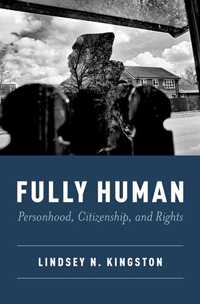'Fully Human': Kingston book takes new look at human rights, 'functioning citizenship'
March 27, 2019

Lindsey Kingston’s monograph Fully Human: Personhood, Citizenship, and Rights was published this month by Oxford University Press.
Kingston argues that citizenship within our current international system signifies being fully human, or being worthy of fundamental human rights. For some vulnerable groups, however, this form of political membership is limited or missing entirely, and they face human rights challenges despite a prevalence of international human rights law.
These protection gaps are central to hierarchies of personhood, or inequalities that render some people more "worthy" than others for protections and political membership. As a remedy, Kingston proposes the ideal of "functioning citizenship," which requires an active and mutually-beneficial relationship between the state and the individual and necessitates the opening of political space for those who cannot be neatly categorized.
It signifies membership in a political community, in which citizens support their government while enjoying the protections and services associated with their privileged legal status. At the same time, an inclusive understanding of functioning citizenship also acknowledges that political membership cannot always be limited by the borders of the state or proven with a passport.
Fully Human builds its theory by looking at several hierarchies of personhood, from the stateless to the forcibly displaced, migrants, nomadic peoples, indigenous nations, and "second class" citizens in the United States. It challenges the binary between citizen and noncitizen, arguing that rights are routinely violated in the space between the two.
Kingston is an associate professor of international human rights in the Department of History, Politics, and International Relations in Webster's College of Arts and Sciences. She also directs Webster’s Institute for Human Rights and Humanitarian Studies.
